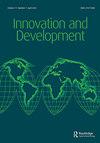探索包容性医疗技术创新在印度资源有限的医疗保健
IF 1.7
Q3 DEVELOPMENT STUDIES
引用次数: 0
摘要
包容性医疗技术创新为发展中国家的地方卫生保健系统提供负担得起的适当产品和服务的潜力已成为学术和政策辩论的一个关键领域。本研究通过研究影响三种创新诊断设备的发展和采用的关键因素、参与者及其相互作用,有助于这些争论,以解决印度医疗保健系统中当地人口的医疗需求。它强调了国家在影响包容性医疗技术创新的发展和采用方面的关键作用。它进一步揭示了融资的可获得性促进了创新的早期发展。与此同时,与不同利益相关者的合作安排有助于当地医疗保健系统的后期开发和创新的采用。这项研究还扩展了医疗技术领域包容性的概念,提供了可负担性的整体解释,即通过获得早期诊断而不是购买产品的成本,在较长时间内降低医疗成本。这些研究结果对创新和卫生保健政策具有重大意义,有助于解决发展中国家可获得卫生保健的挑战。本文章由计算机程序翻译,如有差异,请以英文原文为准。
Exploring Inclusive MedTech Innovations for Resource-Constrained Healthcare in India
The potential of inclusive medical technological innovations to create access to a ff ordable and appropriate products and services for local healthcare systems in developing countries has emerged as a critical area of academic and policy debates. This research contributes to these debates by studying the key factors, actors and their interactions in fl uencing the development and adoption of three innovative diagnostic devices to resolve the healthcare needs of the local population in the Indian healthcare systems. It highlights the critical role of the state in in fl uencing the development and adoption of inclusive MedTech innovations in resource-constraint settings. It further reveals that the availability of fi nance facilitated the early-stage development of innovations. At the same time, collaborative arrangements with a diverse set of stakeholders contributed to late-stage development and adoption of innovations in the local healthcare systems. This research also expands on the conceptualization of inclusivity in the MedTech sector by providing a holistic interpretation of a ff ordability as reducing healthcare costs over a longer period through access to early diagnostics rather than the purchase cost of a product. These research fi ndings have signi fi cant implications for innovation and healthcare policies that can help to resolve the challenges of accessible healthcare in developing countries.
求助全文
通过发布文献求助,成功后即可免费获取论文全文。
去求助
来源期刊

Innovation and Development
Social Sciences-Cultural Studies
CiteScore
3.70
自引率
0.00%
发文量
24
期刊介绍:
conomic development and growth depend as much on social innovations as on technological advances. However, the discourse has often been confined to technological innovations in the industrial sector, with insufficient attention being paid to institutional and organisational change and to the informal sector which in some countries in the South plays a significant role. Innovation and Development is an interdisciplinary journal that adopts a broad approach to the study of innovation, in all sectors of the economy and sections of society, furthering understanding of the multidimensional process of innovation and development. It provides a forum for the discussion of issues pertaining to innovation, development and their interaction, both in the developed and developing world, with the aim of encouraging sustainable and inclusive growth. The journal encourages articles that approach the problem broadly in line with innovation system perspective focusing on the evolutionary and institutional structure of innovation and development. This focus cuts across the disciplines of Economics, Sociology, Political Science, Science and Technology Policy, Geography and Development Practice. In a section entitled Innovation in Practice, the journal includes short reports on innovative experiments with proven development impact with a view to encouraging scholars to undertake systematic inquiries on such experiments. Brief abstracts of degree awarded PhD theses in the broad area of concern for the journal and brief notes which highlight innovative ways of using internet resources and new databases or software are also published.
 求助内容:
求助内容: 应助结果提醒方式:
应助结果提醒方式:


